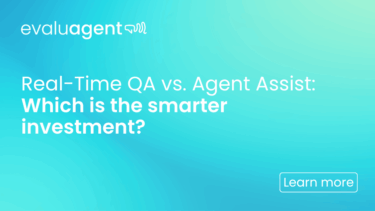Can quality assurance have an impact on employee engagement? The benefits of high levels of employee engagement have long been understood. In fact, that so-called “wonder drug” has high correlations not just with customer satisfaction, but, through that to business success.
Research even shows this is not just an arbitrary correlation: a positive attitude to the work most definitely boosts performance.
In a customer service environment, every decision a leader makes has at least two beneficiaries: the employee and the customer. Maintaining healthy relationships with both is the key to propelling your business growth.
Investing in a QA platform, and building strong supporting processes can help you do just that.
Firstly, what do we mean by QA? Check out this guide on Getting started with Quality Assurance. Now let’s explore five ways measuring quality improves your employee engagement:
- Agents have control
- Agents’ confidence increases
- Improved agent-leader relationships
- Prompt feedback powers up coaching opportunities
- Clearer onboarding process
Agents have control
As an individual contributor in a service environment, agents are often subject to measures of performance that are not entirely “fair”.
Customer Survey responses are not entirely in their control, and are prone to a host of influences that have no bearing on how well the agent is performing their role. Customer Satisfaction surveys usually don’t reflect the single conversation or support interaction; customers use them to reflect their experience with the brand has a whole. There are also wider contextual influences that leadership may just not have exposure to (eg, was the customer just having a bad day?).

Even cultural differences can be a significant factor. A recent study at Yale suggests that “estimates of the relationship between service satisfaction and loyalty are typically affected by various sources of bias”, and ResearchNow tells us very clearly that “significant differences were found in response styles across countries”.
Measuring quality from the inside puts control back in the agent’s hands. One suggestion could be to introduce Agent Self Scoring, a further way to empower agents with self-reflection and self-development. You can read more on this topic here.
Agents’ confidence increases
A quality assurance rubric gives agents more confidence in when they are meeting, exceeding, or falling short of service expectations. It becomes clear where their skills lie, and, importantly, it can help them understand their exact remit, too. A good QA process can ensure procedural compliance, and other trust, safety, security or other industry or standard requirements.
Through that clear measure of compliance, comes the confidence to deliver great service within a clear remit.
There’s a less tangible result of this confidence, too: agents who seem confidence in their communications with customers will subconsciously transmit that confidence in the service to the customer.
Improved agent-leader relationships
It’s common knowledge that people don’t leave jobs, they leave bad bosses and cultures.
Any manager worth their salt will tell you that clarity of expectations is king. In fact, when it comes to setting goals, even something as fundamental as trying to adhere to a SMART goal model can prove elusive when tied to highly subjective CSAT measures.
In a world where half of managers don’t set effective employee goals, ineffective and unclear leadership patterns erode an employee’s trust in the effectivity of their management team. Performance goals and measures that seem unachievable begin a downward spiral of non-engagement.
A QA scheme that has the buy-in of your agents becomes a clear, objective measure of quality, rather than a woolly ‘can you just be more like…me?’. It makes for simpler coaching conversations, and performance reviews.
Trust is built, and the relationship with leaders is improves.
Prompt feedback powers up your coaching opportunities.
Besides having a set of clear objectives, a simple QA rubric allows you to measure quality in the moment, and respond quickly.
Timely feedback is much more effective than delayed feedback. Near-real-time metrics give you ample and almost-instant opportunities for multiple smaller coaching sessions. Agents can modify their behaviours in continual smaller increments, thus avoiding the nasty surprises a quarterly or annual review might otherwise lay them open to. Employees who see these changes have an effect over time are more engaged than those who are kept in the dark until the end of year approaches.
The existence of a QA process, even just managed through spreadsheets, is enough to propel your feedback cycle with agents.
Consider the added power-ups you could gain with cloud-based quality assurance software that expedites and simplifies both the collation and reporting necessary to manage data as you scale.

Clearer onboarding process
New employees feel greater confidence in their value and effectiveness if your onboarding programme is solid and comprehensive. Concentrate only on product knowledge, or organisational knowledge, and you potentially disengage your new hires from their early day-to-day expectations. It can also dissociate their role from those moments of greater depth.
Using your QA process to describe expectations of the role in the early days maximises their opportunities to succeed early.
It fast-tracks their learning curve within the role, and provides context and clarity of conversation with customers, building individual confidence.
You can also build greater transparency into the onboarding process by using a cloud-based tool that gives agents access to their progress and development in an accessible and digestible manner. Onboarding that adjusts, real-time, to the needs of your new-hires amplifies its effectiveness. Both you and your new agents and catch potential problems early in their tenure with your organisation.
Great QA boosts employee engagement
When you take the time to invest in a high quality QA programme and toolset, your employees reap the benefits as much as your customers or business. They benefit from increased control over their destiny, greater self-confidence and confidence in leadership, transparent feedback and more effective onboarding.
Employee engagement is a whole topic on it’s own. Check out more of our articles for further information.
Best of all, a great QA process encourages conversations.
And while processes are not a replacement for real communications on a human level, a transparent and open communications culture will build a sense of organisational and individual honesty, fairness and equality. Everyone has relatively equal influence and value. A team that communicates well also respects each other a little more. A team that communicates well, works well.
There’s not a team on the planet that doesn’t benefit from better communications across the board.
If you’re looking at ways quality assurance can improve your teams engagement, and you want to try EvaluAgent for free, get in touch.




